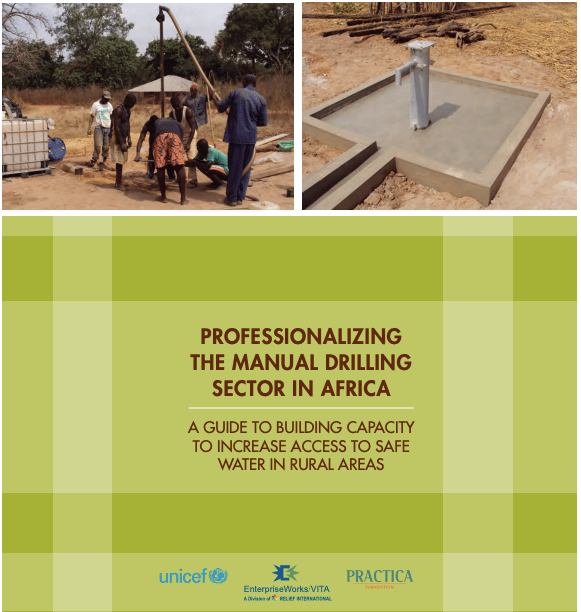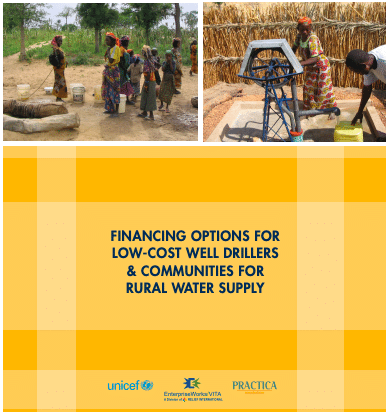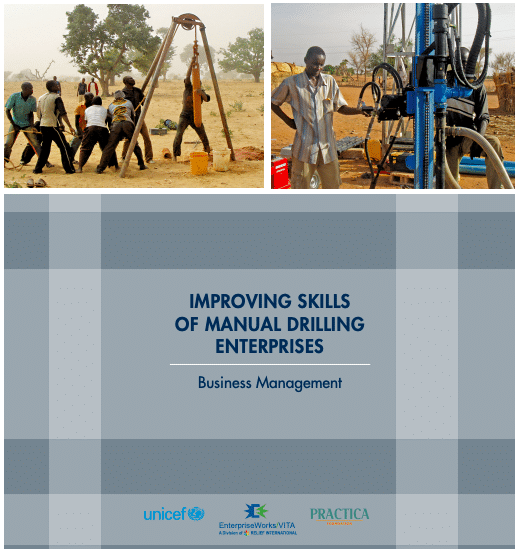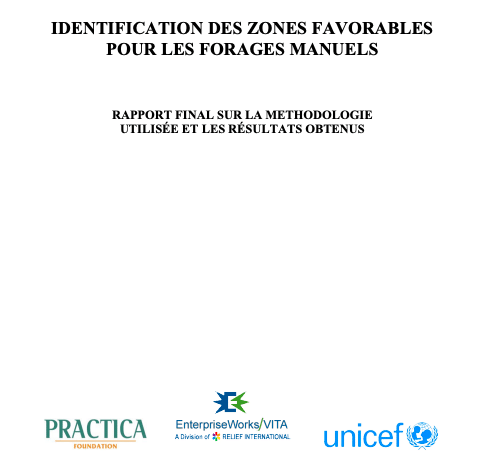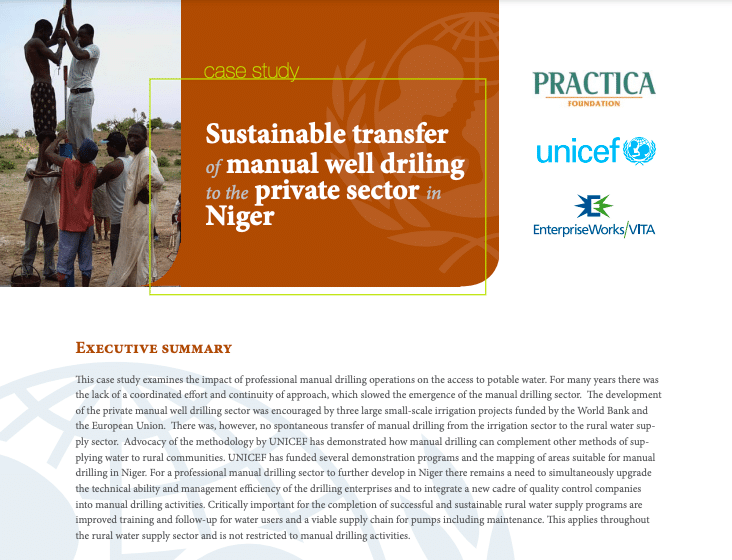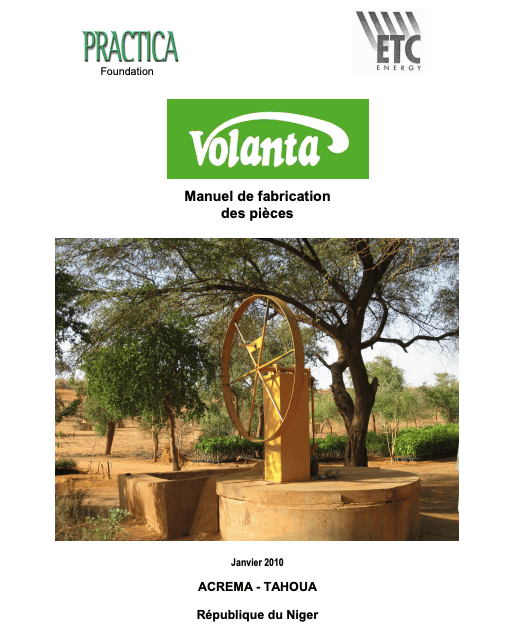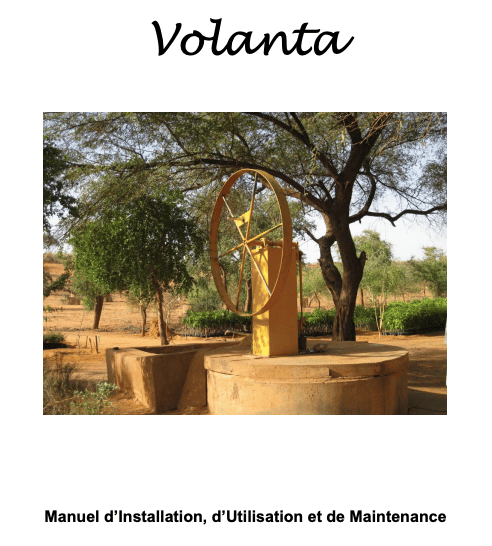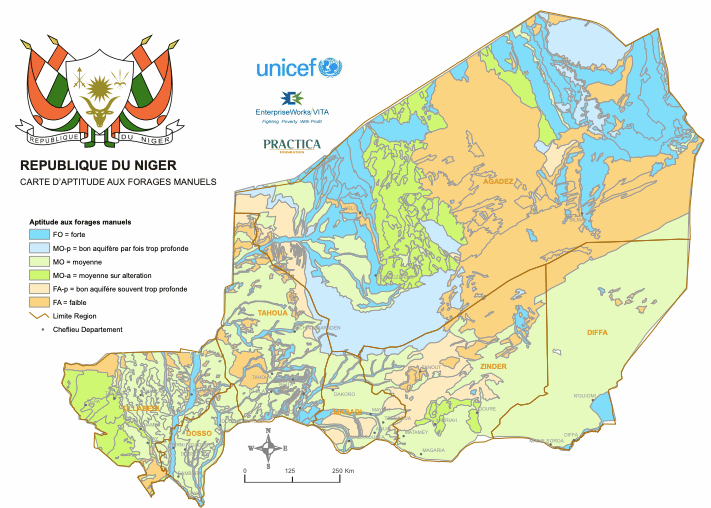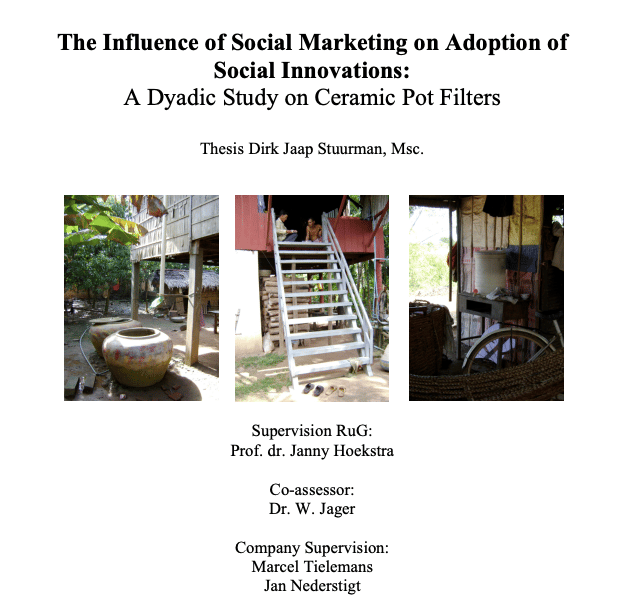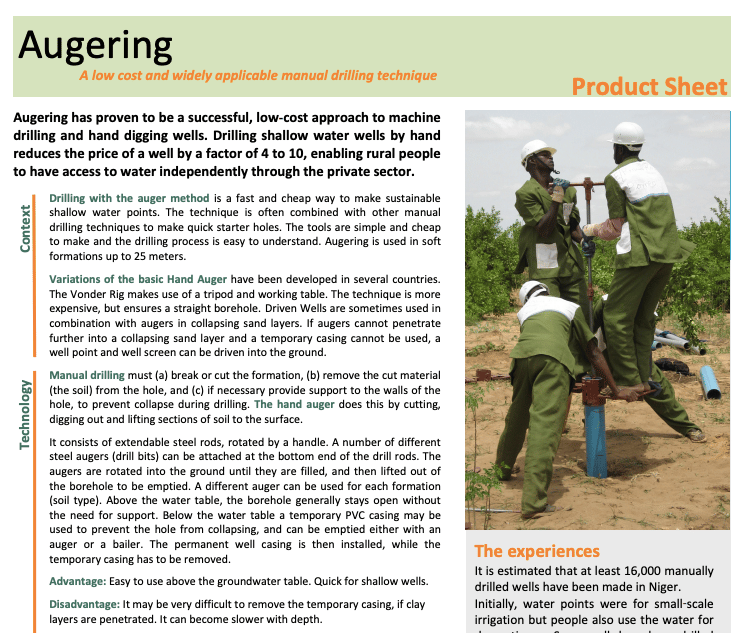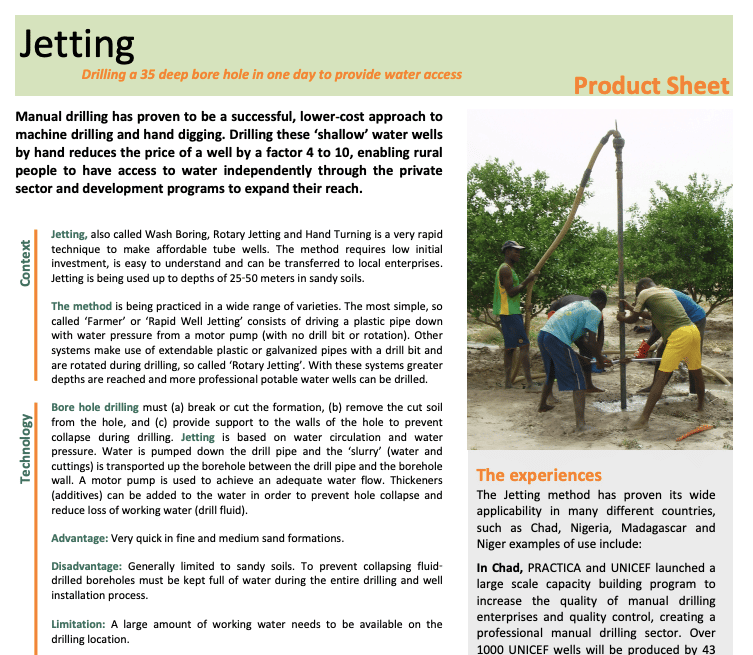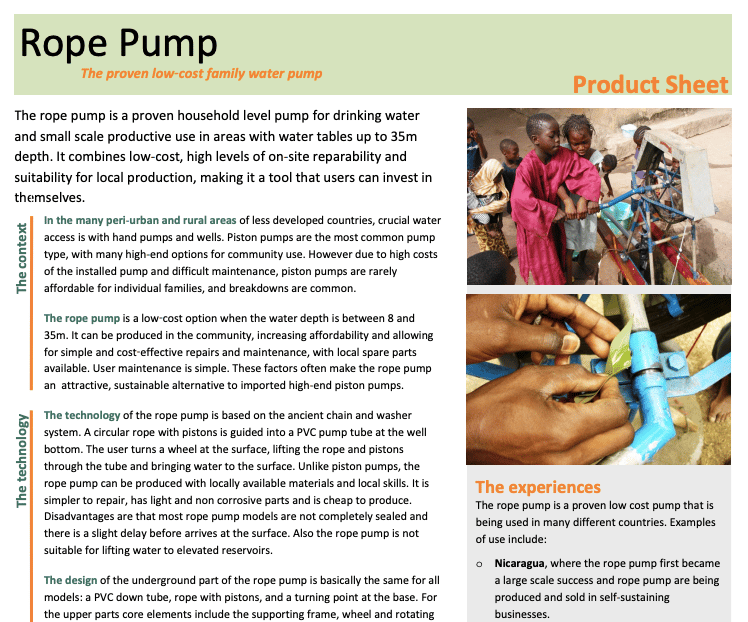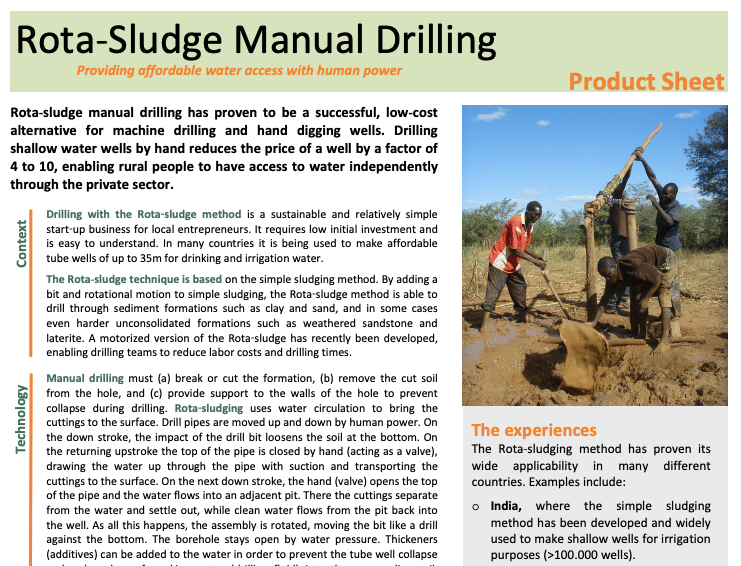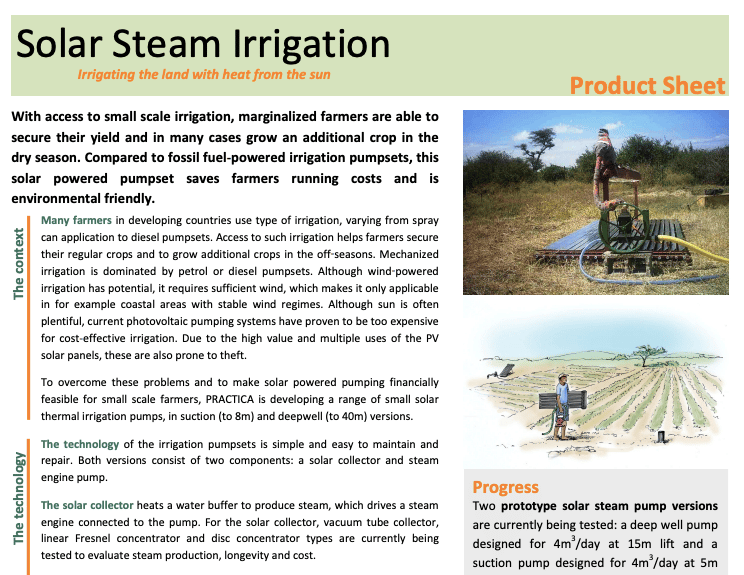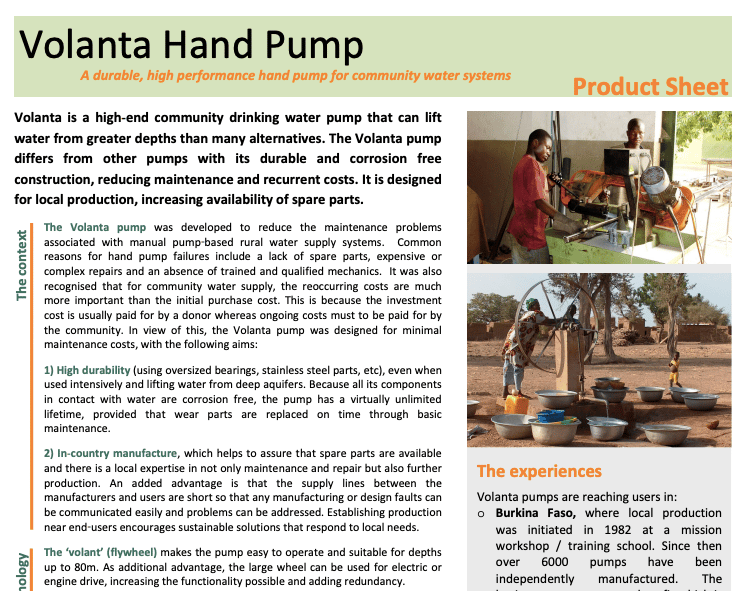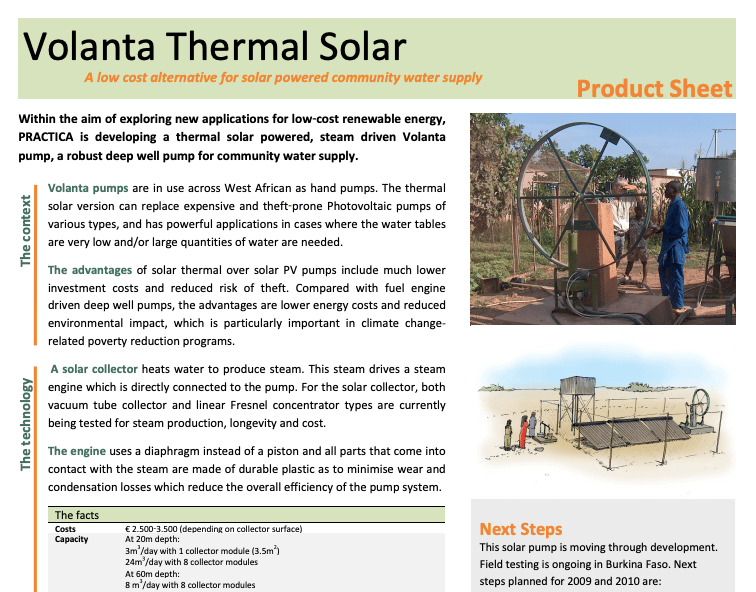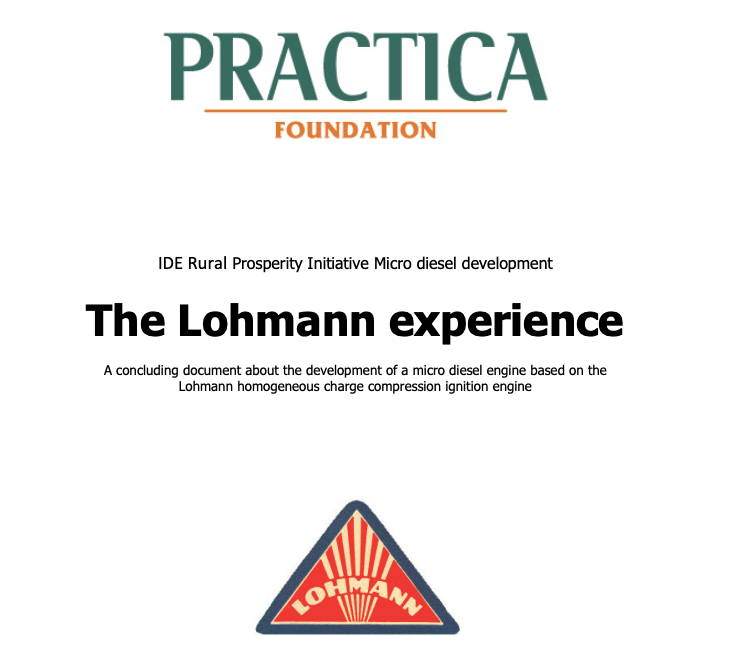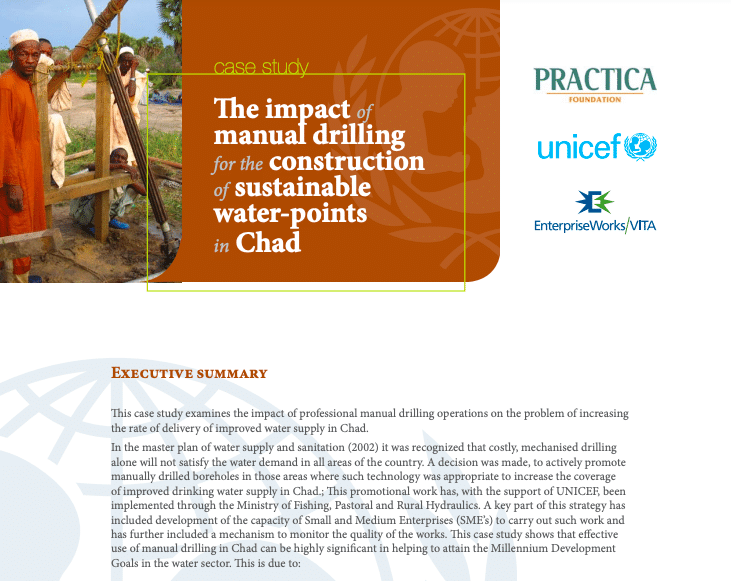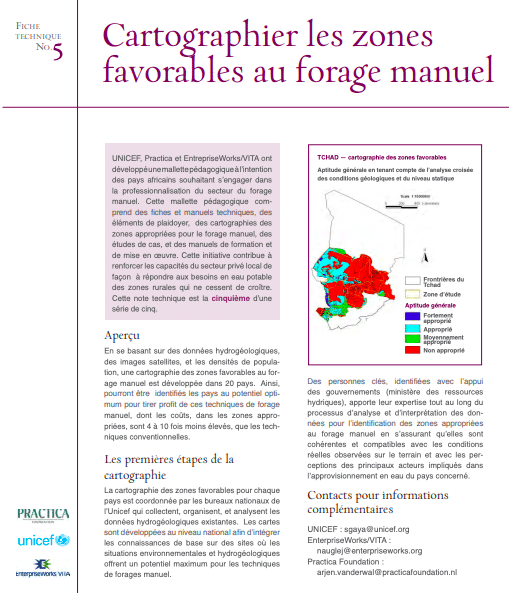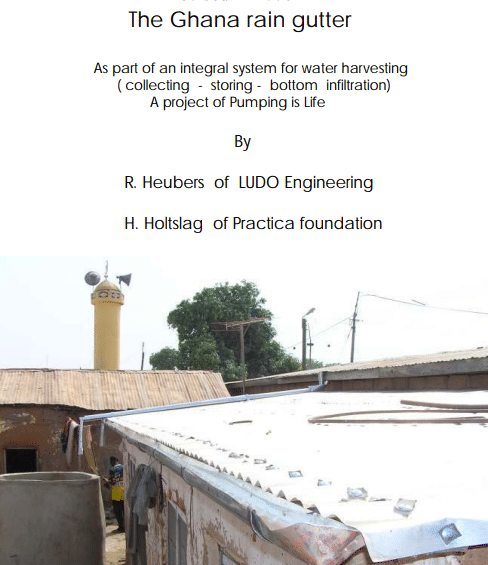Our publications
Resources produced during our past projects are accessible here.
For more than 10 years, we have capitalised documents on groundwater development, irrigation, drinking water supply and sanitation. You can find lessons learnt from the field, project reports, technical sheets, (training) manuals, videos, etc.
Check out and share the information you are interested in with the rest of the sector in order to support local enterprises and strengthen their technical and business skills.
Well drilling: Professionalizing the sector
UNICEF, Practica and Enterprise Works/VITA, a division of Relief International, have developed a toolkit for African countries wishing to embark on the professionalization of manual drilling. This toolkit includes Technical Notes, Technical Manuals, Advocacy Materials, Mapping of suitable areas for manual drilling, Case Studies, and Implementation and Training Manuals. This initiative builds the capacity of the local private sector in order to respond to the ever increasing demand for safe water in rural areas. This manual is a part of this larger set of tools that contribute essential information on how to professionalize manual drilling in Africa.
Well drilling: Financing options
UNICEF, Practica and Enterprise Works/VITA, a division of Relief International, have developed a toolkit for African countries wishing to embark on the professionalization of manual drilling. This toolkit includes Technical Notes, Technical Manuals, Advocacy Materials, Mapping of suitable areas for manual drilling, Case Studies, and Implementation and Training Manuals. This initiative builds the capacity of the local private sector in order to respond to the ever increasing demand for safe water in rural areas. This manual focussing on financing option, is a part of this larger set of tools that contribute essential information on how to professionalize manual drilling in Africa.
Well drilling: Business management
UNICEF, Practica and Enterprise Works/VITA, a division of Relief International, have developed a toolkit for African countries wishing to embark on the professionalization of manual drilling. This toolkit includes Technical Notes, Technical Manuals, Advocacy Materials, Mapping of suitable areas for manual drilling, Case Studies, and Implementation and Training Manuals. This initiative builds the capacity of the local private sector in order to respond to the ever increasing demand for safe water in rural areas. This manual focusing on business management, is a part of this larger set of tools that contribute essential information on how to professionalize manual drilling in Africa.
Identification of area with a good feasibility for manual drilling
As part of the activities to improve drinking water supply in Africa with low-cost techniques, UNICEF has carried out studies (with descriptive report and mapping) in 12 countries with the aim of estimating the potential for application of manual drilling techniques at the level of each country, by identifying areas that are considered priorities for the future development of the program in terms of aptitude favorable and presence of population with low access to drinking water. This is a report describing the methodology used and the results obtained from studies and manual drilling mapping in 12 countries.
Sustainable transfer of manual well driling to the private sector in Niger
This case study examines the impact of professional manual drilling operations on the access to potable water. For many years there was the lack of a coordinated effort and continuity of approach, which slowed the emergence of the manual drilling sector. The development of the private manual well drilling sector was encouraged by three large small-scale irrigation projects funded by the World Bank and the European Union. UNICEF has funded several demonstration programs and the mapping of areas suitable for manual drilling in Niger. For a professional manual drilling sector to further develop in Niger there remains a need to simultaneously upgrade the technical ability and management efficiency of the drilling enterprises and to integrate a new cadre of quality control companies into manual drilling activities.
Manufacturing manual Volanta pumps
The Volanta pump can be used for drinking water and irrigation supply. The pump has been designed by one expert of Practica, and the design is now available to be used and reproduced at will. This manual details the material needed to manufacture the pump and the way to assemble them. It contains images and detailed explanations.
Installation, use and maintenance manual Volanta
Volanta pumps have been developed to be robust, and easily repairable by local mechanics in the field. It is meant to be a reliable way to supply drinking water on the long term. A smaller version of the pump exists and can be used for smallscale farmer-led irrigation. The Volanta pumps are currently manufactured and distributed in Burkina Faso and Niger.
Feasibility maps of manual drilling – Multiple countries
These maps show the feasibility for manual drilling in ten countries of Sub-Saharan Africa (Mali, Liberia, Sierra Leone, Ivory Coast, Benin, Niger, Tchad, Central African Republic, Madagascar, Zambia, Madagascar). Areas with high feasibility present a good potential to drill manually, and therefore at a low cost, boreholes of a high quality for drinking water supply. Maps are available in English or in French depending on the spoken language of the country.
The Influence of Social Marketing on Adoption of Social Innovations – A Dyadic Study on Ceramic Pot Filters
This research focuses on the adoption of ceramic water filters. Ceramic water filters are filters that can provide clean drinking water to their user and are mostly produced and marketed by NGO’s in developing or less developed countries. More specific, this research focuses on the reasons that make people decide to buy a product like a ceramic water filter and how they are
approached best in terms of social marketing.
Product Sheet: Augering
Augering has proven to be a successful, low‐cost approach to machine drilling and hand digging wells. Drilling shallow water wells by hand reduces the price of a well by a factor of 4 to 10, enabling rural people to have access to water independently through the private sector.
Product Sheet: Jetting
Manual drilling has proven to be a successful, lower‐cost approach to machine drilling and hand digging. Drilling these ‘shallow’ water wells by hand reduces the price of a well by a factor 4 to 10, enabling rural people to have access to water independently through the private sector and development programs to expand their reach.
Product Sheet: Rope pump
The rope pump is a proven household level pump for drinking water and small scale productive use in areas with water tables up to 35m depth. It combines low‐cost, high levels of on‐site reparability and suitability for local production, making it a tool that users can invest in themselves.
Product Sheet: Rota Sludge Manual drilling
Rota‐sludge manual drilling has proven to be a successful, low‐cost alternative for machine drilling and hand digging wells. Drilling shallow water wells by hand reduces the price of a well by a factor of 4 to 10, enabling rural people to have access to water independently through the private sector.
Product Sheet: Solar steam pump
With access to small scale irrigation, marginalized farmers are able to secure their yield and in many cases grow an additional crop in the dry season. Compared to fossil fuel‐powered irrigation pumpsets, this solar powered pumpset saves farmers running costs and is environmental friendly.
Product Sheet: Volanta handpump
Volanta is a high‐end community drinking water pump that can lift water from greater depths than many alternatives. The Volanta pump differs from other pumps with its durable and corrosion free construction, reducing maintenance and recurrent costs. It is designed for local production, increasing availability of spare parts.
Product Sheet: Volanta Solar Pump
Within the aim of exploring new applications for low‐cost renewable energy, PRACTICA is developing a thermal solar powered, steam driven Volanta pump, a robust deep well pump for community water supply.
The Lohmann experience
A concluding document about the development of a micro-diesel engine based on the Lohmann homogeneous charge compression ignition engine.
Impact of manual drilling for the construction of sustainable water-points in Chad
This case study examines the impact of professional manual drilling operations on the problem of increasing the rate of delivery of improved water supply in Chad.
In the master plan of water supply and sanitation (2002) it was recognized that costly, mechanised drilling alone will not satisfy the water demand in all areas of the country. A decision was made, to actively promote manually drilled boreholes in those areas where such technology was appropriate to increase the coverage of improved drinking water supply in Chad.; This promotional work has, with the support of UNICEF, been implemented through the Ministry of Fishing, Pastoral and Rural Hydraulics. A key part of this strategy has included development of the capacity of Small and Medium Enterprises (SME’s) to carry out such work and has further included a mechanism to monitor the quality of the works. This case study shows that effective use of manual drilling in Chad can be highly significant in helping to attain the Millennium Development Goals in the water sector.
Mapping areas with a good manual drilling potential
Fiche informative sur la méthodologie employée pour cartographier les zones favorables au forage manuel.
The Ghana rain gutter
Manual on the production of rain gutters, as part of an integral system for rain water harvesting. Rain gutters can be made of many materials and in many shapes. It depends on the availability of raw materials, tools, traditions and requirements which type a customer likes to purchase. The aim of the project is to achieve a very low cost water harvesting system.

